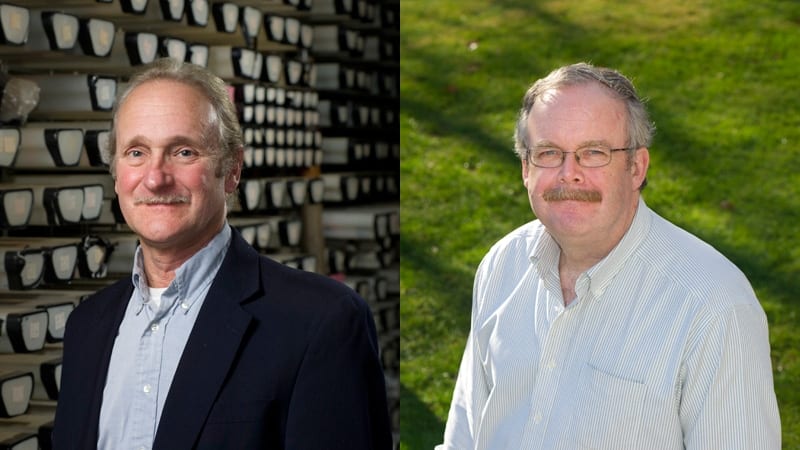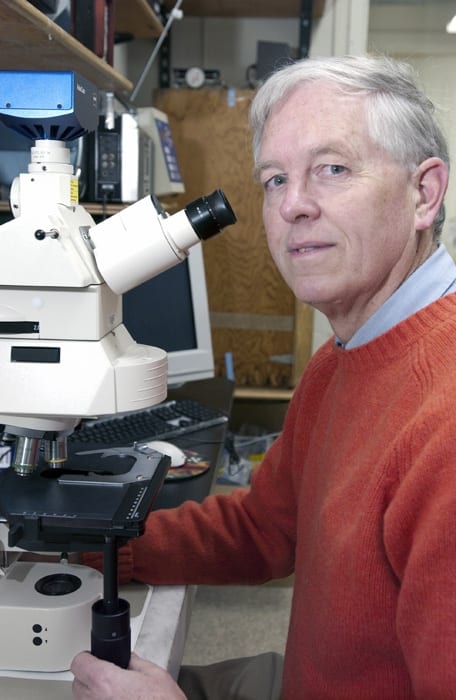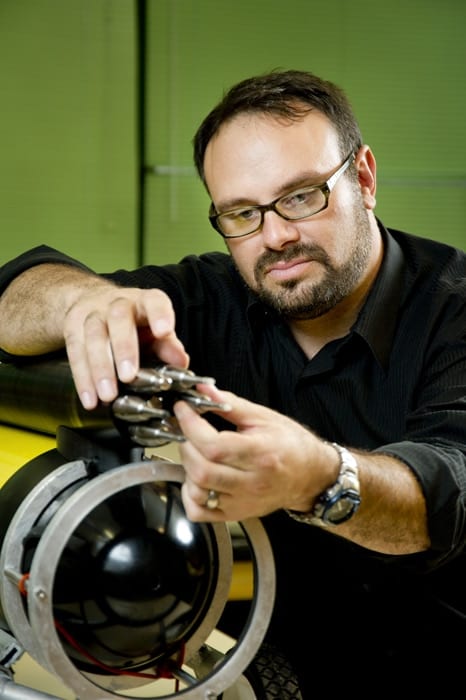News Releases
WHOI to Host Public Forum on Climate Change and Global Water Supplies
Severe droughts, floods, and storms are now a routine part of our nation’s weather forecast. Remarkably hot and dry weather in 2011 caused droughts in Texas, the Plains states and…
Read MorePacific Islands May Become Refuge for Corals in a Warming Climate, Study Finds
Scientists have predicted that ocean temperatures will rise in the equatorial Pacific by the end of the century, wreaking havoc on coral reef ecosystems. But a new study shows that climate change could cause ocean currents to operate in a surprising way and mitigate the warming near a handful of islands right on the equator. As a result these Pacific islands may become isolated refuges for corals and fish.
Read MoreStudy Amplifies Understanding of Hearing in Baleen Whales
For decades, scientists have known that dolphins and other toothed whales have specialized fats associated with their jaws, which efficiently convey sound waves from the ocean to their ears. But until now, the hearing systems of their toothless grazing cousins, baleen whales, remained a mystery, largely because specimens to study are hard to get. Now, a new study by scientists at Woods Hole Oceanographic Institution has shown that some baleen whales also have fats leading to their ears.
Read MoreResearchers Report Potential for a “Moderate” New England “Red Tide” in 2012
New England is expected to experience a “moderate” regional “red tide” this spring and summer, report NOAA-funded scientists working in the Gulf of Maine to study the toxic algae that causes the bloom. The algae in the water pose no direct threat to human beings, however the toxins they produce can accumulate in filter-feeding organisms such as mussels and clams— which can cause paralytic shellfish poisoning (PSP) in humans who consume them.
Read MoreSampling the Pacific for Signs of Fukushima
An international research team is reporting the results of a research cruise they organized to study the amount, spread, and impacts of radiation released into the ocean from the tsunami-crippled…
Read MoreWHOI Team Uses Advanced Imaging Data to Bring a New View of Titanic to the World
Newly released images of the Titanic wreck site provide the first unrestricted view of the world’s most notable maritime heritage site. These new images add to the already unprecedented collection…
Read MoreWHOI Researchers, Collaborators Receive $1.4 Million to Study Life in Ocean’s Greatest Depths
Scientists from the Woods Hole Oceanographic Institution (WHOI), University of Hawaii, Whitman College and international colleagues will conduct the first systematic study of life in the deepest marine habitat on…
Read MoreWHOI Scientists Contribute to Study on Impact to Coral Communities from Deepwater Horizon Spill
Six scientists from Woods Hole Oceanographic Institution (WHOI) have contributed to a new report finding “compelling evidence” that the Deepwater Horizon oil spill has impacted deep-sea coral communities in the…
Read MoreStudy of Patagonian Glacier’s Rise and Fall Adds to Understanding of Global Climate Change
Increased global temperatures are frequently viewed as the cause of glacial melt, but a new study of Patagonia’s Gualas Glacier highlights the role of precipitation in the glacier’s fluctuation. The study, conducted by Sbastien Bertrand of the Woods Hole Oceanographic Institution (WHOI) and his colleagues, compares past temperature and rainfall data with sediment records of glacier fluctuations and the historical observations of early Spanish explorers.
Read MoreStudy Links Major Shifts in Indian Civilizations to Past Changes in Monsoon
A fundamental shift in the Indian monsoon has occurred over the last few millennia, from a steady humid monsoon that favored lush vegetation to extended periods of drought, reports a new study led by researchers at the Woods Hole Oceanographic Institution (WHOI). The study has implications for our understanding of the monsoon’s response to climate change.
Read MoreSpecial Fukushima Session at 2012 Ocean Sciences Meeting
The March 11, 2011, earthquake, tsunami, and subsequent radioactivity releases from the Fukushima Dai-ichi nuclear power plants resulted in the largest accidental release of radiation to the ocean in history.…
Read MoreWHOI Scientists Awarded Distinctions from The Oceanography Society and American Geophysical Union
Jim Yoder Named 2012 fellow of The Oceanography Society Jim Yoder, Vice President for Academic Programs and Dean at the Woods Hole Oceanographic Institution (WHOI), has been named a 2012…
Read MoreWHOI Receives $1Million from Keck Foundation for First Real-Time Seafloor Earthquake Observatory at Cascadia Fault
One of the most dangerous faults in North America is the Pacific Northwest’s Cascadia fault – an offshore, subduction zone fault capable of producing a magnitude 9 earthquake that would damage Portland, Tacoma, Seattle, and Victoria, British Columbia, and generate a large tsunami. Yet there are currently no instruments installed offshore, directly above the fault, for measuring the strain that is currently building up along the fault.
But a recent $1 million grant from The W. M. Keck Foundation to scientists at the Woods Hole Oceanographic Institution (WHOI) will change that. An interdisciplinary project led by WHOI geologist Jeff McGuire, an expert in global earthquake seismology and geodesy, and John Collins, director of WHOI’s Ocean Bottom Seismometer Lab, will build and install the first seafloor geodesy observatory above the expected rupture zone of the next great Cascadia earthquake.
Two WHOI Scientists Named 2012 Fellows of the American Association for the Advancement of Science
Woods Hole Oceanographic Institution Senior Scientists Lloyd Keigwin and Robert Weller have been elected 2012 fellows of the American Association for the Advancement of Science (AAAS). Election as a fellow…
Read MoreWHOI’s John Waterbury receives NAS Gilbert Morgan Smith Medal
The National Academy of Sciences (NAS) has awarded John Waterbury, scientist emeritus in the Biology Department at the Woods Hole Oceanographic Institution (WHOI), the 2012 Gilbert Morgan Smith Medal. Waterbury…
Read MoreMysterious Flotsam in Gulf of Mexico Came from Deepwater Horizon Rig, Study Finds
Shortly after the Deepwater Horizon disaster, mysterious honeycomb material was found floating in the Gulf of Mexico and along coastal beaches. Using state-of-the-art chemical forensics and a bit of old-fashioned…
Read MoreLouis St. Laurent Receives Nicholas P. Fofonoff Award From AMS
Louis St. Laurent of the Woods Hole Oceanographic Institution (WHOI) was selected by the American Meteorological Society (AMS) to receive the prestigious Nicholas P. Fofonoff Award. There will be a…
Read MoreFour WHOI Scientists Contribute to Comprehensive Picture of the Fate of Oil from Deepwater Horizon Spill
A new study provides a composite picture of the environmental distribution of oil and gas from the 2010 Deepwater Horizon spill in the Gulf of Mexico. It amasses a vast…
Read MoreStudy Examines How Diving Marine Mammals Manage Decompression
How do marine mammals, whose very survival depends on regular diving, manage to avoid decompression sickness? Do they, indeed, avoid it? A workshop held by WHOI’s Marine Mammal Center brought together the world’s experts in human diving and marine-mammal diving physiology to discuss the issue of how marine mammals manage gas under pressure.
Read MoreTwo WHOI Scientists Receive Medals from the American Geophysical Union
Woods Hole Oceanographic Institution scientists Henry Dick, a geologist, and Joseph Pedlosky, a physical oceanographer, have been selected to receive two of the American Geophysical Union’s prestigious medals this year. The awards will be given at an honors ceremony on December 7 in San Francisco at the American Geophysical Union (AGU) Fall Meeting, the largest worldwide conference in the geophysical sciences, attracting nearly 20,000 Earth and space scientists, educators, students, and policy makers.
Read MoreResearchers Assess Radioactivity Released to the Ocean from the Fukushima Dai-Ichi Nuclear Power Facility
The impact on the ocean of releases of radioactivity from the Fukushima nuclear power plants remains unclear. But a new study by U.S. and Japanese researchers analyzes the levels of radioactivity discharged from the facility in the first four months after the accident and draws some basic conclusions about the history of contaminant releases to the ocean.
Read MoreWHOI Statement on the R/V Atlantis Rescue at Sea of 93 Egyptians
The research vessel Atlantis, operated by Woods Hole Oceanographic Institution (WHOI), rescued 93 Egyptians aboard a disabled fishing boat in the Mediterranean Sea late Friday night (Nov. 25).
Read MoreWHOI Director of Research to Join Mass. Governor Patrick on Innovation Economy Mission to Brazil
Woods Hole Oceanographic Institution (WHOI) Executive Vice President and Director of Research Larry Madin will join Massachusetts Governor Deval Patrick and a coalition of business executives, academic leaders, and government officials on the Massachusetts-Brazil Innovation Economy Mission 2011 this December to pursue job growth and economic development partnerships between Massachusetts and Brazil.
Read MoreLong-Term Carbon Storage in Ganges Basin May Portend Global Warming Worsening
Global warming could destabilize the pool of carbon in the Ganges-Brahmaputra basin and similar places on Earth, potentially increasing the rate of CO2 release into the atmosphere.
Read More




